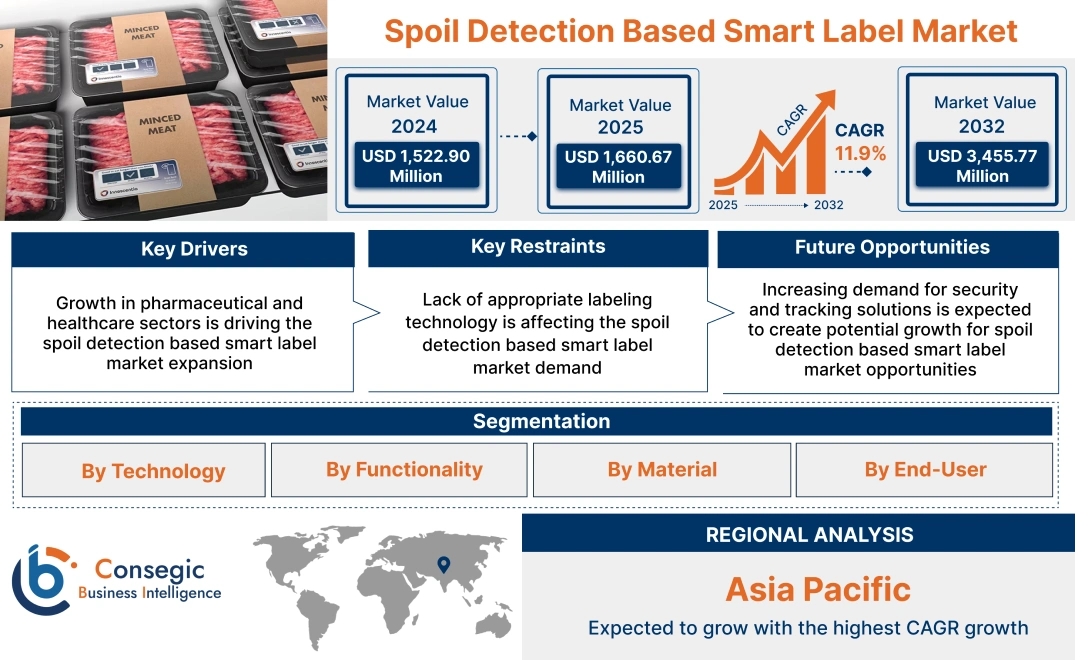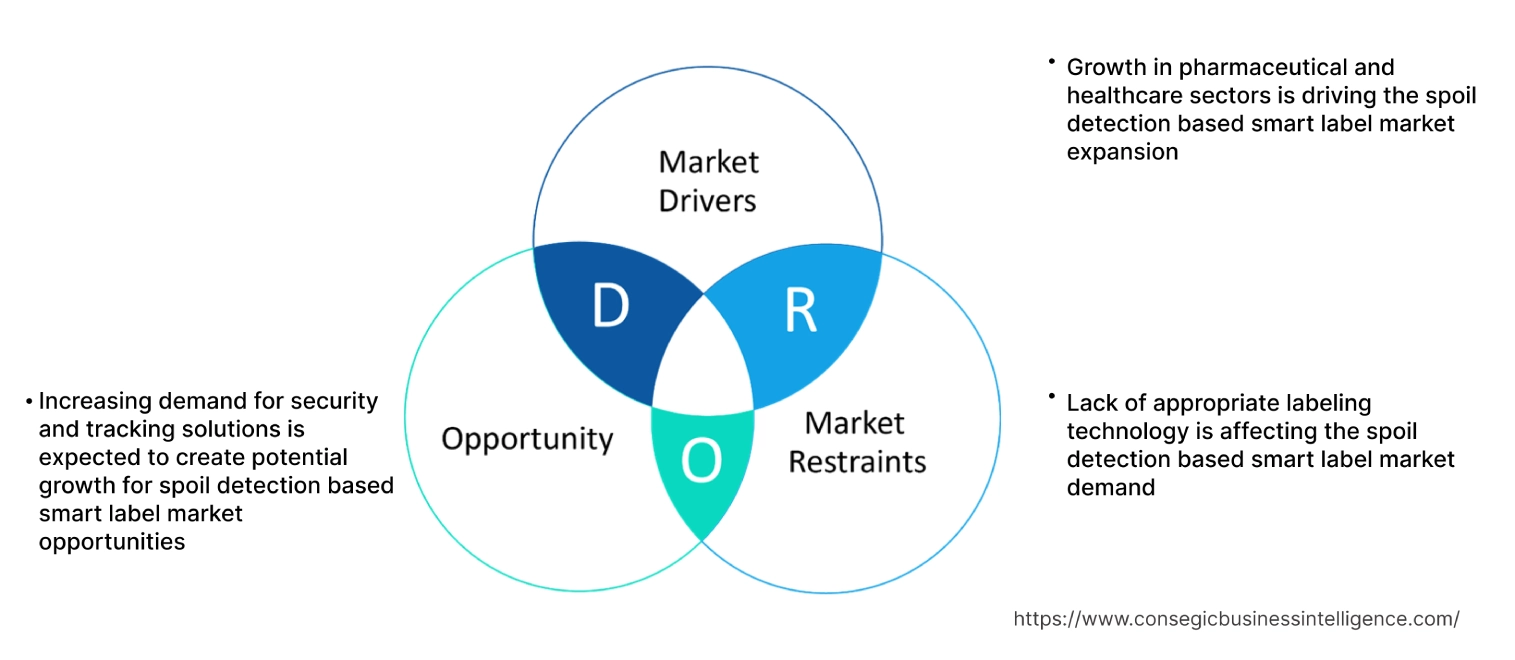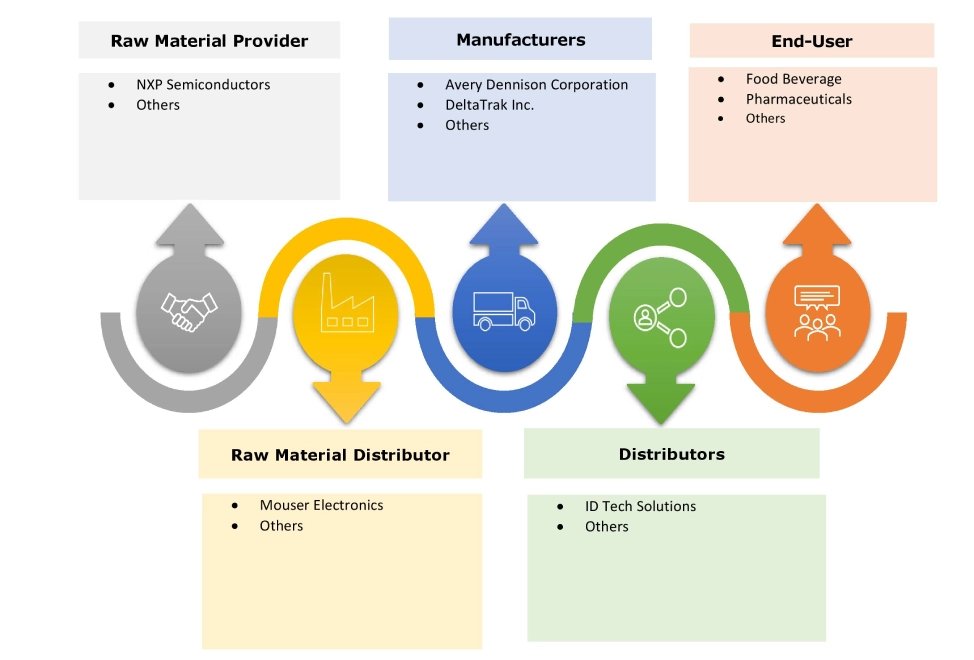- Summary
- Table Of Content
- Methodology
Spoil Detection Based Smart Label Market Size:
Spoil Detection Based Smart Label Market Size is estimated to reach over USD 3,455.77 Million by 2032 from a value of USD 1,522.90 Million in 2024 and is projected to grow by USD 1,660.67 Million in 2025, growing at a CAGR of 11.9% from 2025 to 2032.
Spoil Detection Based Smart Label Market Scope & Overview:
Spoil detection based smart label integrate advanced sensing technologies to detect and indicate the freshness and quality of food products, pharmaceuticals, and other perishable items in real-time. By providing timely and accurate information about product condition and shelf life, spoil detection-based smart labels play a crucial role in reducing food waste, ensuring product safety, and enhancing consumer confidence.
Key Drivers:
Growth in pharmaceutical and healthcare sectors is driving the spoil detection based smart label market expansion
As the pharmaceutical sector expands, there is an increasing demand for advanced packaging solutions that ensure the safety and efficacy of medicines. Smart labels with spoil detection capabilities play a crucial role in maintaining product integrity by monitoring environmental conditions such as temperature, humidity, and contamination. These labels help pharmaceutical companies comply with stringent regulatory requirements and minimize losses due to spoilage, making them an essential component of modern pharmaceutical logistics.
Further, the healthcare sector focuses on patient safety and quality assurance, which further boosts the adoption of spoil detection-based smart labels. Hospitals, clinics, and healthcare providers rely on these smart labels to monitor the quality of medical supplies, vaccines, and biologics. With the rising demand for biologics and temperature-sensitive drugs, smart labels ensure that these products remain within safe usage conditions. The increasing adoption of digital health technologies and smart packaging solutions aligns with this trend, driving further investments in spoil detection labels.
- For instance, in December 2021, SpotSee launched its temperature monitoring device, the Vaccine Vial Indicator. The device was developed to help sustain the vaccine cold chain. With this temperature solution, the company aims to work with drug manufacturers that want to incorporate temperature indication directly on the product label.
Thus, according to the spoil detection based smart label market analysis, the growing advancements in healthcare sector are driving the spoil detection based smart label market size.
Key Restraints:
Lack of appropriate labeling technology is affecting the spoil detection based smart label market demand
Many consumers may not be familiar with smart labeling technologies and their potential to enhance food quality and freshness. Similarly, businesses in the food industry may not fully grasp the value proposition of smart labels or understand how they can integrate them into their operations effectively. Without sufficient education and information about the capabilities and advantages of smart labeling technologies, consumers are hesitant to trust products labeled with smart labels, while businesses may overlook the potential benefits of implementing these solutions in their supply chains. As a result, there is a significant need for efforts to raise awareness and provide education about smart labels, highlighting their ability to enhance food safety, extend shelf life, and reduce food waste.Thus, the above analysis depicts that the aforementioned factors would further impact the spoil detection based smart label market size.
Future Opportunities :
Increasing demand for security and tracking solutions is expected to create potential growth for spoil detection based smart label market opportunities
Companies can integrate advanced features such as real-time tracking, temperature monitoring, and IoT connectivity, enabling businesses to gather detailed insights into product conditions throughout the supply chain. These additional services can help food and pharmaceutical companies optimize inventory management, reduce waste, and improve regulatory compliance, making smart labels a more attractive investment. Another aspect for value-added services is the incorporation of consumer engagement tools within smart labels. By integrating QR codes, NFC (Near Field Communication), or augmented reality (AR), brands can provide end-users with product information, freshness status, and safety instructions. This not only enhances transparency but also fosters consumer trust and brand loyalty. Additionally, integrating blockchain technology can further improve traceability, ensuring authenticity and reducing counterfeiting risks, which is particularly beneficial in the food and pharmaceutical industries.
- For instance, in March 2025, Zebra Technologies unveiled automation solution, Aurora Velocity scan tunnel, across warehousing, manufacturing, and supply chain operations at ProMat event. The solution capabilities include dimensioning, AI-powered HAZMAT goods label detection, package damage inspection, and optical character recognition.
Thus, based on the above spoil detection based smart label market analysis, the growing technological advancements in tracking solutions are expected to drive the spoil detection based smart label market opportunities and trends.
Spoil Detection Based Smart Label Market Segmental Analysis :
By Technology:
Based on technology, the spoil detection based smart label market is segmented into temperature indicators, time-temperature indicators, biochemical indicators, and radio frequency identification (RFID) labels.
Trends in technology:
- With the rise of e-commerce, globalization of supply chains, and increasing awareness of sustainability issues, there is a growing need for effective tools to monitor and manage the freshness and integrity of perishable goods throughout their journey, from production to consumption.
- The smart labels use RFID technology, which enables automatic identification and tracking of products throughout the supply chain, while sensing labels provide continuous monitoring of environmental conditions such as temperature, humidity, and gas levels.
- Thus, the above factors are driving the spoil detection based smart label market demand.
The temperature indicators segment accounted for the largest revenue share of 37.04% in the year 2024.
- With foodborne illnesses and spoilage becoming major concerns, temperature indicators offer a reliable method to ensure that products have been stored and transported under optimal conditions. The increasing prevalence of strict regulations and standards by food safety authorities globally is further propelling the need for temperature indicators to comply with these standards.
- Barcode-based indicators are gaining traction in various industries that require detailed traceability and compliance with stringent regulatory standards. Despite being more expensive than color-based indicators, their ability to provide detailed data makes them highly valuable in industries such as pharmaceuticals.
- Thus, based on the above analysis, these factors are further driving the spoil detection based smart label market growth.
The RFID labels segment is anticipated to register the fastest CAGR during the forecast period.
- The growing emphasis on digitization, IoT integration, and data-driven decision-making is driving the need for RFID smart labels globally. As industries increasingly rely on connected devices and smart technologies to optimize their operations, the importance of accurate and timely data capture becomes paramount.
- By leveraging radio frequency waves, RFID smart labels enable businesses to automatically identify and monitor their assets, products, or inventory in real-time, offering a significant improvement over traditional barcode system.
- For instance, in February 2022, Identiv Inc. expanded its portfolio of near field communication-enabled (NFC) detection tags for advanced IoT security. These tags have unique capabilities for advancing tamper detection, anti-counterfeiting, and provide battery less condition sensing features.
- Thus, based on the above analysis, these trends are expected to drive the spoil detection based smart label market share during the forecast period.
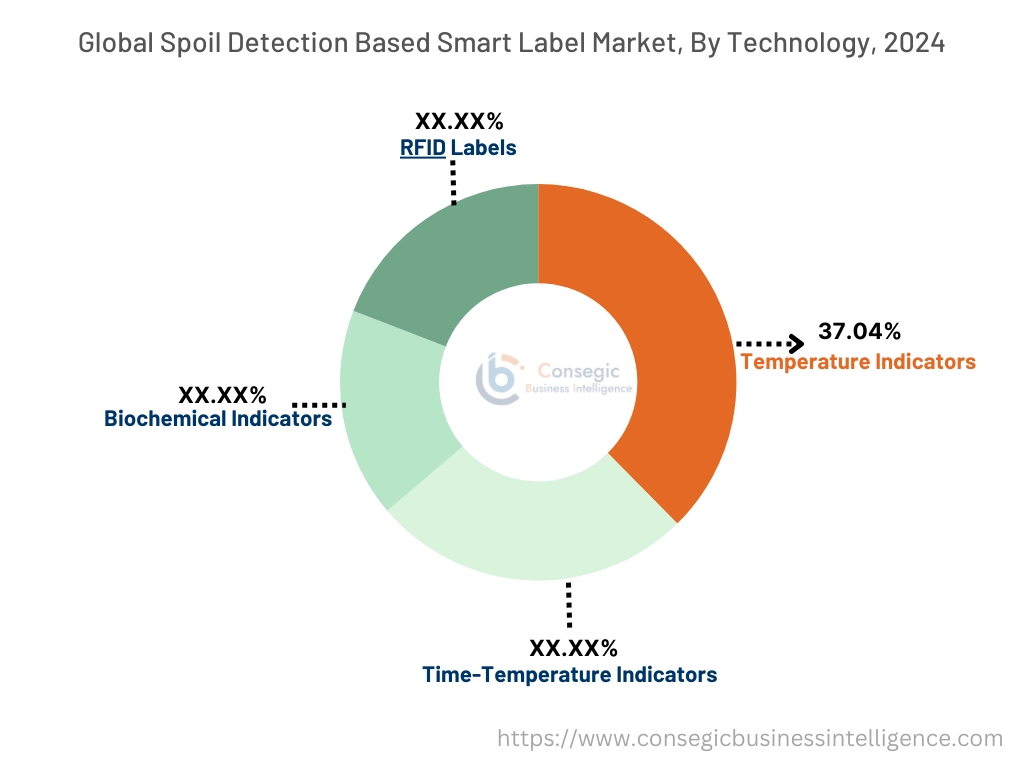
By Functionality:
Based on functionality, the spoil detection based smart label market is segmented into monitoring, tracking, alerting, and reporting.
Trends in functionality:
- Governments and regulatory bodies worldwide are implementing stringent regulations and standards to ensure product safety, authenticity, and traceability throughout the supply chain. These regulations often mandate the use of tracking and identification technologies to facilitate accurate and efficient product tracking and monitoring.
- The adoption of smart labels can unlock additional benefits, such as improved inventory management, reduced operational costs, and enhanced customer satisfaction.
The monitoring segment accounted for the largest revenue in the year 2024.
- The monitoring functionality in spoil detection based smart labels plays a crucial role in assessing environmental conditions that impact product quality. These labels are equipped with sensors to detect changes in temperature, humidity, and gas emissions, which are key indicators of spoilage.
- Industries such as food and beverages, pharmaceuticals, and healthcare rely heavily on monitoring-based smart labels to ensure that perishable goods remain safe for consumption.
- With real-time monitoring, businesses can take proactive measures to prevent spoilage, reduce waste, and maintain compliance with safety regulations.
- For instance, in April 2022, SpotSee introduced FreezeSafe, a new low-cost temperature indicator designed to detect unacceptably low temperatures in products. FreezeSafe offers easy visual inspection and comes in two temperature thresholds, 0°C and 2°C, providing a simple and effective solution for temperature monitoring during shipping and storage.
- Thus, based on the above analysis, these factors would further supplement the spoil detection based smart label market
The reporting segment is anticipated to register the fastest CAGR during the forecast period.
- Reporting functionality is essential for maintaining detailed records of product conditions throughout the supply chain. Smart labels with reporting capabilities collect and store data over time, providing valuable insights into trends related to spoilage and storage conditions.
- Businesses can use this information for compliance reporting, quality assurance, and process optimization.
- Additionally, reporting features help manufacturers and suppliers make data-driven decisions to enhance product longevity and improve supply chain efficiency.
- By leveraging historical data, companies can identify recurring issues, implement better storage solutions, and ensure regulatory compliance in sensitive industries such as pharmaceuticals and food safety.
- These developments in the reporting segment are anticipated to further drive the spoil detection based smart label market trends during the forecast period
By Material:
Based on material, the spoil detection based smart label market is segmented into paper, polymer, metal, and composite.
Trends in material:
- The growing emphasis on biodegradable and recyclable smart labels to meet consumer preferences for eco-friendly products is driving the need for spoilage detection solutions.
- Composite materials enable the integration of multiple spoil detection mechanisms, such as gas sensors, RFID technology, and time-temperature indicators, ensuring comprehensive monitoring. The increasing need for hybrid solutions that offer both affordability and high performance is expected to drive the growth of composite-based smart labels in the market.
The paper segment accounted for the largest revenue share in the year 2024.
- Paper-based smart labels are widely used in the spoil detection market due to their cost-effectiveness, ease of printing, and biodegradability.
- These labels are commonly integrated with ink-based indicators or biosensors that change color when exposed to spoilage conditions such as temperature fluctuations or gas emissions.
- The food and beverage sector significantly benefits from paper-based smart labels, as they provide an eco-friendly solution for monitoring product freshness.
- Thus, based on the above analysis, these developments in the paper segment are driving the spoil detection based smart label market growth.
The polymer segment is anticipated to register the fastest CAGR during the forecast period.
- Polymer-based smart labels offer enhanced durability and flexibility, making them suitable for various packaging materials, including plastics and flexible pouches.
- These labels can incorporate advanced sensor technologies such as temperature-sensitive polymers and gas-detecting films, allowing for more precise spoil detection.
- Industries such as pharmaceuticals and healthcare rely on polymer-based labels to ensure product integrity throughout storage and transportation. Additionally, their ability to withstand harsh environmental conditions makes them ideal for long-term monitoring applications, further driving their adoption in the market.
- These factors are anticipated to further drive the spoil detection based smart label market trends during the forecast period.
By End-User:
Based on end user, the spoil detection based smart label market is segmented into food beverage, pharmaceuticals, logistics and supply chain, and agriculture.
Trends in end user:
- With the growing complexity and value of electronic components and IT assets, spoilage detection technology offers a reliable and efficient solution to track and manage the assets throughout the lifecycle. This ensures better inventory visibility, reduced losses, and improved operational efficiency for businesses.
- By tagging pallets and equipment with smart labels, companies can automate their warehouse operations, optimize storage space, and enhance overall supply chain visibility. This helps in reducing manual errors, improving inventory accuracy, and streamlining logistics operations, thereby, increasing efficiency and reducing operational costs.
The food and beverage segment accounted for the largest revenue share in the year 2024.
- In the food and beverage sector, spoil detection-based smart labels are utilized to monitor the freshness and quality of perishable goods, such as dairy products, meats, fruits, and vegetables.
- For instance, in November 2020, Innoscentia AB announced the collaboration with Ynvisible Interactive Inc., to utilize Ynvisible's displays for expiry date labels on food packages. Innocentia has developed materials that enable real-time monitoring of food and reduce food waste. It will detect spoiled food, even before expiry date.
- These labels can detect changes in temperature, humidity, and oxygen levels that could indicate spoilage or contamination.
- By providing accurate and timely information about product condition, smart labels help food manufacturers, retailers, and consumers make informed decisions about product safety and shelf life.
- Thus, based on the above factors, these developments in the food and beverage sector are driving the global market.
The pharmaceuticals segment is anticipated to register the fastest CAGR during the forecast period.
- In the pharmaceutical sector, spoil detection-based smart labels play a critical role in ensuring the safety and integrity of pharmaceutical products throughout the supply chain.
- These labels can monitor temperature, humidity, and other environmental factors to prevent spoilage and degradation of sensitive medications and vaccines.
- By providing real-time alerts and data tracking capabilities, smart labels help pharmaceutical companies maintain compliance with regulatory standards and ensure product efficacy and quality.
- These factors are anticipated to further drive the global market during the forecast period.
Regional Analysis:
The regions covered are North America, Europe, Asia Pacific, the Middle East and Africa, and Latin America.
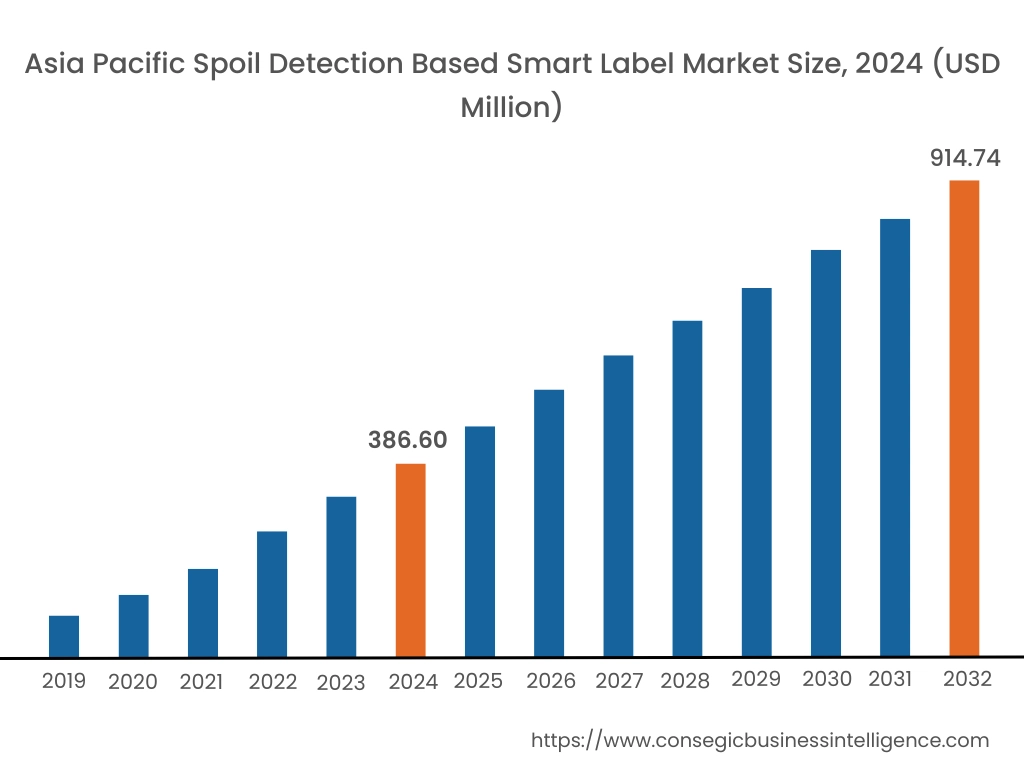
Asia Pacific spoil detection based smart label market expansion is estimated to reach over USD 914.74 million by 2032 from a value of USD 386.60 million in 2024 and is projected to grow by USD 432.08 million in 2025. Out of this, the China market accounted for the maximum revenue split of 30.87%. Asia Pacific is emerging as a significant market for spoil detection based smart label, driven by factors such as rapid urbanization, a growing middle-class population, and heightened awareness of food safety concerns. As consumers become more conscious of the quality and safety of food products, the need for spoil detection-based smart labels is likely to surge. Additionally, government initiatives aimed at modernizing food supply chains and enhancing regulatory frameworks are expected to accelerate market growth in the region. With its growing economic influence and expanding consumer base, the Asia Pacific region presents lucrative opportunities for smart label manufacturers and suppliers. These factors would further drive the regional market during the forecast period.
- For instance, in August 2024, Bar Code India (BCI), a provider of supply chain solutions, launched Dristi, a IoT-based RFID reader, for retail sector. The reader is built to enable retail organizations to access and leverage real-time data, while providing elevated standards of supply chain management.
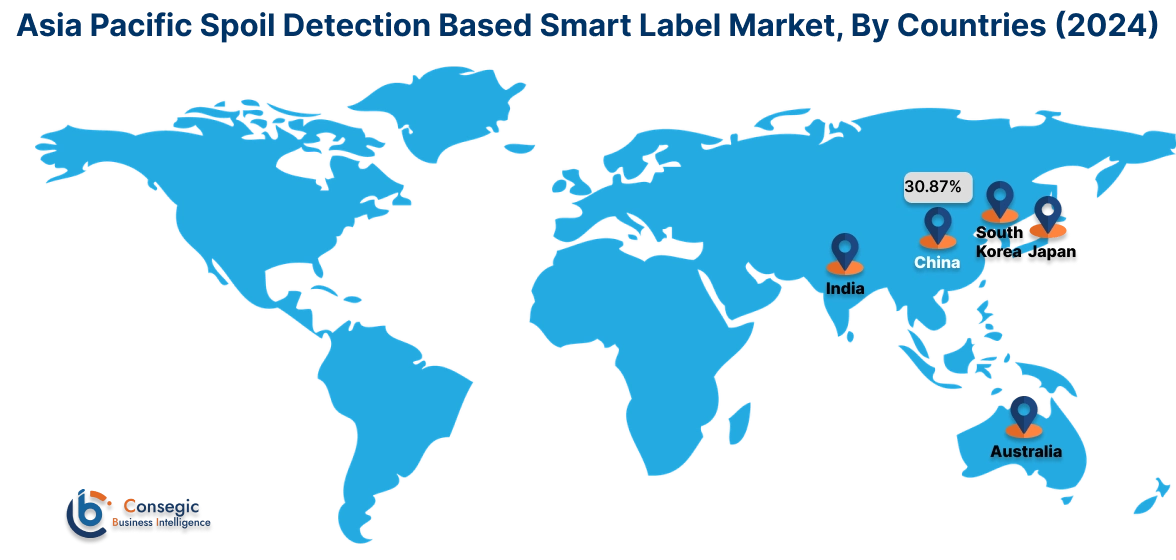
North America market is estimated to reach over USD 1,313.54 million by 2032 from a value of USD 581.80 million in 2024 and is projected to grow by USD 634.16 million in 2025. The region's advanced infrastructure, increasing adoption of IoT technologies, and strong presence of key industry players contribute to the market growth. North American industries, particularly retail, logistics, and healthcare, are utilizing spoil detection technology, leveraging its capabilities for inventory management, asset tracking, and supply chain optimization. Additionally, the region's focus on technological innovation and digital transformation further propels the demand for smart labels, driving the market growth. These factors would further drive the spoil detection based smart label in the regional market.
- For instance, in October 2024, Avery Dimension launched Optica, a full-service portfolio of supply chain solutions for apparel sector. The portfolio combines RFID smart labels, in-field hardware, and technical support, to provide brands and factories with visibility and greater control into manufacturing units.
Additionally, according to the analysis, the spoil detection based smart label industry in Europe is projected to witness significant development during the forecast period. The European market benefits from a mature retail sector, stringent regulatory standards, and increasing emphasis on sustainability and supply chain transparency. European industries are increasingly adopting smart labels to comply with regulatory requirements, improve operational efficiency, and enhance customer satisfaction. Further, the region's strong logistics network, coupled with growing investments in IoT and related technologies, positioned Europe as a key market for smart label adoption and innovation.
Additionally, Latin America represents an emerging market for spoil detection solutions, fueled by the expanding pharmaceutical and food processing industries, growing urbanization, and rising investments in technology infrastructure. Regulatory reforms, trade agreements, and changing consumer preferences are driving the adoption of smart label solutions across the region, particularly in countries such as Brazil, Mexico, and Argentina. Further, Middle East and African regions are adopting radio frequency identification technology, which is driven by robust manufacturing activities, increasing investments in smart cities, and advancements in retail automation and logistics management. The region's dynamic retail sector, coupled with rising demand for efficient supply chain solutions, accelerates the adoption of tags for inventory management, anti-counterfeiting measures, and customer engagement initiatives.
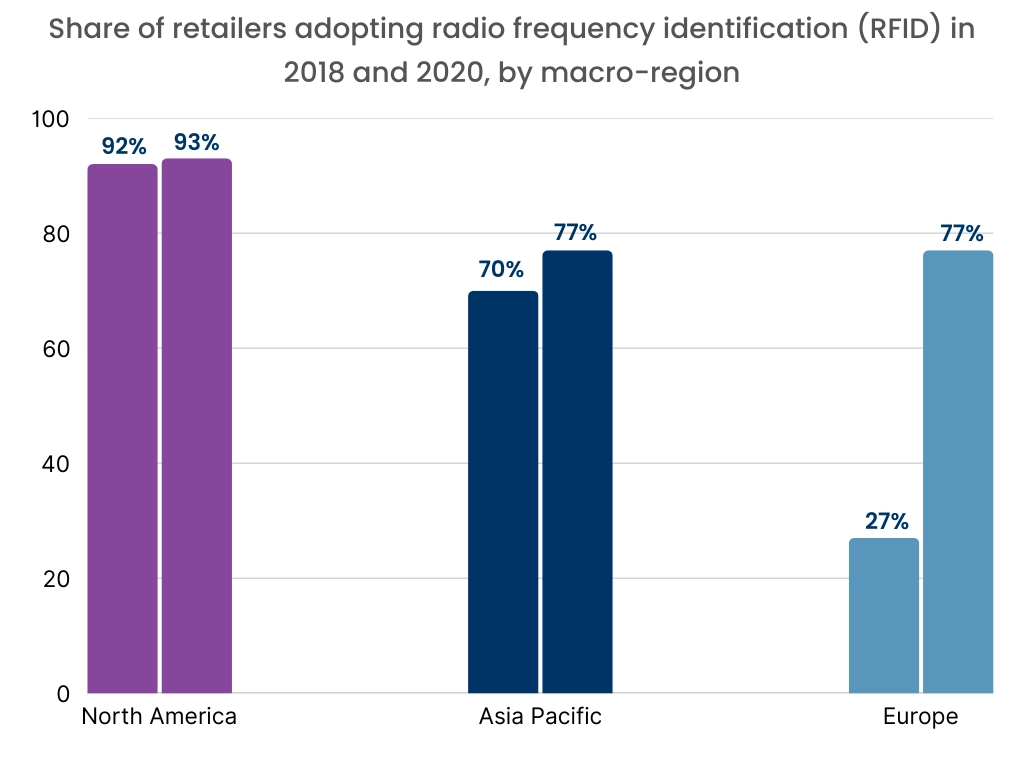
Top Key Players and Market Share Insights:
The global spoil detection based smart label market is highly competitive with major players providing products to the national and international markets. Key players are adopting several strategies in research and development (R&D), product innovation, and end-user launches to hold a strong position in the market. Key players in the spoil detection based smart label industry include-
- American Thermal Instruments Inc. (U.S.)
- Avery Dennison Corporation (U.S.)
- DeltaTrak Inc. (U.S.)
- Evigence Sensors (U.S.)
- Innoscentia (Sweden)
- Insignia Technologies Ltd (U.K.)
- Molex LLC (U.S.)
- OM MAS CO. LTD (Thailand)
- CCL Industries (U.S.)
- SpotSee (U.S.)
- Timestrip UK Ltd (U.K.)
Recent Industry Developments :
>Expansion:
- In April 2022, Avery Dimension expanded their new operations in Greater Noida, India. The new facility will produce advanced and pressure-sensitive materials for the labeling and packaging sectors. The new manufacturing unit improves the production capacity and further strengthens the company’s position in the market.
Spoil Detection Based Smart Label Market Report Insights :
| Report Attributes | Report Details |
| Study Timeline | 2019-2032 |
| Market Size in 2032 | USD 3,455.77 Million |
| CAGR (2025-2032) | 11.9% |
| By Technology |
|
| By Functionality |
|
| By Material |
|
| By End-User |
|
| By Region |
|
| Key Players |
|
| North America | U.S. Canada Mexico |
| Europe | U.K. Germany France Spain Italy Russia Benelux Rest of Europe |
| APAC | China South Korea Japan India Australia ASEAN Rest of Asia-Pacific |
| Middle East and Africa | GCC Turkey South Africa Rest of MEA |
| LATAM | Brazil Argentina Chile Rest of LATAM |
| Report Coverage |
|
Key Questions Answered in the Report
How big is the Spoil Detection Based Smart Label Market? +
Spoil Detection Based Smart Label Market Size is estimated to reach over USD 3,455.77 Million by 2032 from a value of USD 1,522.90 Million in 2024 and is projected to grow by USD 1,660.67 Million in 2025, growing at a CAGR of 11.9% from 2025 to 2032.
Which is the fastest-growing region in the Spoil Detection Based Smart Label Market? +
Asia-Pacific is the region experiencing the most rapid growth in the market.
What specific segmentation details are covered in the Spoil Detection Based Smart Label report? +
The Spoil Detection Based Smart Label report includes specific segmentation details for technology, functionality, material, end user, and region.
Who are the major players in the Spoil Detection Based Smart Label Market? +
The key participants in the market are American Thermal Instruments Inc (U.S.), Avery Dennison Corporation (U.S.), DeltaTrak Inc. (U.S.), Evigence Sensors (U.S.), Innoscentia (Sweden), Insignia Technologies Ltd (U.K.), Molex LLC (U.S.), OM MAS CO. LTD (Thailand), CCL Industries (U.S.), SpotSee (U.S.), Timestrip UK Ltd (U.K.), and others.
